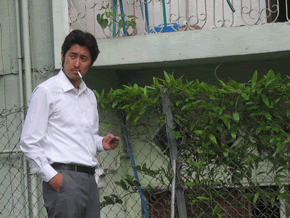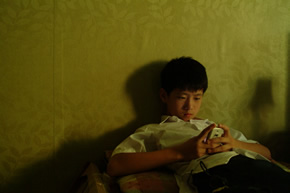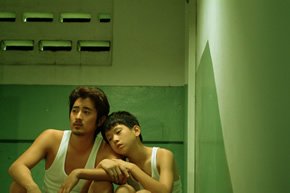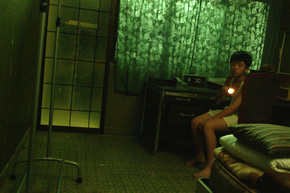|
Genre:
Drama
Director: Royston Tan
Starring: Kim Young Jun, Xiao Li Yuan
RunTime: 1 hr 33 mins
Released By: Zhao Wei Films & Shaw
Rating: NC16 (Brief Nudity)
Official Website: www.zhaowei.com/430
Release
Date: 29 June 2006
Synopsis
:
4:30
traces the relationship between Zhang Xiao Wu, an eleven year
old Chinese Boy, and his
tenant Jung, a thirty-something Korean man. Told entirely
from the perspective of the boy, Xiao
Wu, this story of two very different characters is less about
friendship than about a shared
experience and appreciation of solitude. 4:30 starts with
Xiao Wu sneaking to the room of Jung in the early hours of
the morning, and stealing from the Korean man. Just as getting
intoxicated is a habit for Jung, who only staggers back to
his rented room when drunk, soon stealing for Xiao Wu becomes
equally as compulsive. We soon realise that Jung’s true
intention for staying in Singapore is suicide. It is only
through Xiao Wu’s encounter with Jung failing in his
bid to die that Xiao Wu begins to understand his true fascination
with Jung.
Ultimately, 4:30, as the title suggests is about a moment,
a boy’s attempt to cling to it escaping his drab reality,
in a life yet fully lived. Yet it too opens us to the possibility
that in this age of the urban, of the tall apartment blocks,
of the cityscape, that the loneliness that a city-dweller
feels not only transcends cultural and geographic boundaries
but that it is also not inevitable.
Movie
Review:
Royston
Tan’s 4:30 is much more than just a character study
of a 11-year-old boy who’s left in the care of a reclusive
Korean tenant who spends more time in a drunken stupor than
he does outside his room. It’s an intricate and personal
look at isolation and loneliness in a bustling and fast-paced
society where there are those who impose it upon themselves
while there are also others who find it beyond their control.
Much like Albert Camus’s book, The Stranger, it follows
a singular character through a journey of desperate solitude
that touches on death, observation and estrangement.
As expected,
time plays a significant part of the film’s motif. It’s
almost palpable, serving as a boundary for the boy, Xiao Wu
(Xiao Li Yuan) to cross the lines that he would not dare pass
when there is light. The other and possibly the most essential
element of the film that is easily conveyed would be detachment
and the general sense of alienation felt by the youth in Singapore.
The film is by no means an exposition of this subject but
an observation. In the case of Xiao Wu, he yearns for the
attention and care of the adults around him, to no avail.
Unlike the tenant, Jung (Kim Young Jun) who voluntarily shuts
himself from everyone, to a life lacking meaning and affection.
Exploring
the boy’s intimacy (and privacy) issues, Tan shows early
on how Xiao Wu acts on his fascination with the man next to
his own room. Sneaking in before dawn, he rummages through
his possessions and quietly observes the man’s slumber.
Taking pictures and collecting items including body hair,
he mementos them into his diary, detailing when and what he
did. He develops a bit of an obsession as he tries to get
attention from Jung by mischievously leaving messages and
items outside his door. Interestingly, they share a common
past time – trying to die. Now, this isn’t the
crux of the film’s plot but it does show the sort of
anguish they live with.
Tan places
ambiguous markers throughout the film, suggesting to us that
the non-relationship that Xiao Wu and Jung have are remnants
of a dream or a childlike reverie concocted by a lonely boy
such as when Xiao Wu chugs down a bottle of cough mixture
each day. The 13-year-old actor, Li Yuan is utterly outstanding
in his role. Carrying the entirety of the film on his back,
his remarkably nuanced and layered portrayal of a tortured
soul was the mainstay of Tan’s vision for the film.
Unlike
Tan’s previous film in 15, when quick, stylish edits
and a sprinting storyline formed its pith, 4:30 is slow and
mellow while focusing on our country’s inner issues
as opposed to the previous film’s overt nature. It never
becomes tedious, as it draws attention to the every detail
and action of its characters with terrific direction. With
only a handful of instances in which dialogue is used, the
sound design had to be impeccably effective to get the emotions
across, coupled with prominent ambient sounds.
The visual
metaphors are strongly attuned to the character’s emotions
and the ensuing mood. Tan illustrates the ability to craft
an edgy discomfort from the silence and contemplation from
his actors. The scenes with the 2 leads are deeply engaging
and often intense especially when his long, fixed shots are
intently framed as though photographs.
With
an intelligent mixture of gorgeous art direction and complex
psychological perspectives, Royston Tan has probably created
the most mature and accomplished Singapore feature production
to date. Its ‘international’ feel goes in tandem
with the local tastes and could find more fans abroad. Those
who had the privilege of viewing Tan’s most prominent
feature, 15, might have found it overrated due to its controversy.
But with his latest bow, you owe it to yourselves to witness
more from arguably Singapore’s most talented auteur.
Movie
Rating:
   
(Quite possibly the finest Singaporean film released this
year)
Review
by Justin Deimen
|





